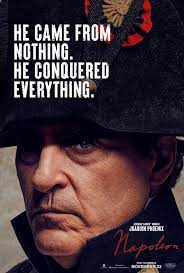
I had been looking forward to Napoleon’s release for months. I don’t remember when I saw the first trailer for it, but as soon as I saw that Ridley Scott was directing Joaquin Phoenix, my initial response was, “Yes, please!” I had visions of Gladiator dancing in my head, and my expectations for this film were through the roof. And I will freely admit, that’s on me. I don’t know if my expectations for this film were unreasonably high, but they were high, and Ridley Scott and Napoleon did not meet them.
The Good
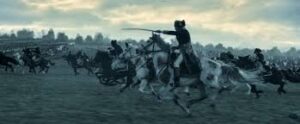
Napoleon is a superb visual film. The production design is gorgeous, the costumes were immaculate, the VFX enhanced everything without drawing attention away from the narrative, and the lighting reflected the mood of every scene perfectly. Ridley Scott and his team built a world that felt lived in. There were times when the costumes were ill-fitting, which brought a subtle realistic component to the look of the film. There were several scenes that took place at night, and candlelight provided the only illumination, which brought warmth to those scenes and often matched the warm mood those scenes were trying to convey. The battle scenes were often gray, wintery scenes, with the only color being the red blood that freely splashed through the air and on the ground. The production design was beautiful when it wanted to be and jarring when it had to be.
The cinematography was amazing. Director of Photography Dariusz Wolski presented a world that felt like eighteenth and nineteenth-century Europe. He wasn’t afraid to make us wait with long takes that slowly revealed what we needed to see. In equal parts, he showed us what was gruesome and what was glamorous about the day.
One of the projects that Stanley Kubrick wanted to make but was unable to before his death was a film about Napoleon and Josephine. I’m sure Ridley Scott was aware of that, and there are a lot of moments that seem to pay homage to Kubrick as a filmmaker, whether in the use of Kubrickian cinematography tropes, or the use of classical music as the score in ways that felt like Kubrick was in the editing room, there were stretches of this film that felt like they were being directed by Kubrick himself.
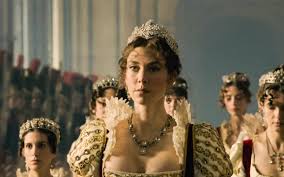
Vanessa Kirby as Josephine was a treasure. She played the role with panache and wit and snark and pain. All of the levels were perfect, and she brought Josephine back to life in a way that made it plausible that the most powerful man in the world at that time obviously would have been obsessed with her. Kirby’s performance as Josephine was nothing short of sublime.
Overall, this is a very entertaining film. The action sequences are exciting and riveting, and the movie, as a whole, did what it needed to do to keep the audience engaged, at least on the surface level.
The Bad
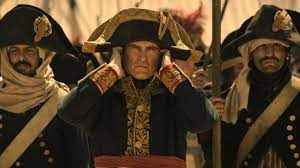
From a storytelling standpoint, this film is full of missed opportunities. As engaging as Napoleon was on the surface, it lacked that much in-depth. It felt like Ridley Scott was trying so hard to cram as much as he could into two and a half hours, and in doing that, he didn’t adequately explore anything in terms of how these characters, especially Napoleon and Josephine, felt about each other. That led me to walk out of the theater realizing that I didn’t care about any of them. There were moments in the film that should have been emotionally powerful but fell flat because the groundwork hadn’t been laid to create depth in their relationships.
I remember seeing a quote from Kubrick when discussing why he wanted to make a film about Napoleon and Josephine, and he relayed that he was fascinated by the intensity and passion in their relationship. Ridley Scott teased us in this film with one scene of Napoleon telling Josephine that she was nothing without him, and then her turning the tables to get him to admit that he was nothing without her. It showed at once the potential for toxicity and codependency that could have driven the emotional content of the story, and then he never went back to it. Other than giving us some narration of letters they wrote back and forth, there was nothing that built their relationship.
In fact, just the opposite happened when there were sex scenes that showed Josephine completely disinterested and Napoleon only interested in providing an heir for himself. We saw no passion and even less emotion. Then, at the critical time when Napoleon discovers that Josephine has died, the audience should have been given an emotionally impactful scene, but it fell flat. Then, at the end of the film when we learn that Napoleon’s last word was “Josephine,” we don’t care. We weren’t adequately shown the love they had for each other, and other than one scene where Napoleon pulls Josephine under the breakfast table to make love to her, we weren’t shown the passion that they had for each other. All of that was crucial in giving the audience an emotional hook upon which to hang their hats, and we never got it.
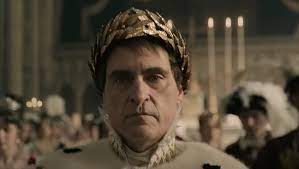
Vanessa Kirby’s performance as Josephine may have been sublime, but she was miscast. Joaquin Phoenix’s performance as Napoleon was understated and brooding in its intensity, but he was miscast as well. In real life, Josephine was ten years older than Napoleon, and that was the reason that she was unable to become pregnant and produce him an heir. That age difference was at least reversed in this film, and it created a disconnect. Josephine already had two children from her deceased husband when she met Napoleon, and if you didn’t know about their real-life age difference, the fact that she was unable to get pregnant in this film wouldn’t make sense. It also snubs much of the realism that the filmmakers were striving for in other areas. The decision is understandable from a marketing perspective, but it created a disconnect in the film that, artistically, they weren’t able to overcome.
Overall
Overall, I give this film a C. Perhaps that’s due to my overinflated expectations for the film, but I feel like that’s being generous. I was entertained, but being entertained by a film like this isn’t enough. I wanted to feel something and I felt nothing. Walking out of a movie like this feeling empty is worse than feeling bad. I wanted a lump in my throat at the end of this film but was left feeling hollow. Still, I would recommend seeing it in the theater if you get a chance. The visuals and battle scenes are worth it.